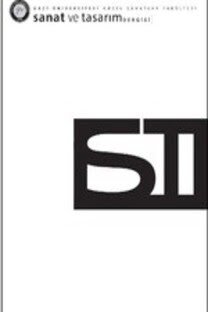Bilim ve Sanatın Birbirini Tamamlaması
Bu makale, sanatta ve bilimde örneklemeyi incelemektedir. Hem bilimsel deneyler hem de sanat eserleri, sahip oldukları özelliklerinden bazılarını vurgulamakta, görüntülemekte veya aktarmaktadır. Böylece bu özelliklere dikkat çekerek eserlerin incelenmesi ve yansıtılması için hazır hale getirirler. Michelson-Morley deneyi, ışık hızının sabitliğini örnekler. Pollock, boya viskozitesini örneklendirir. Yine de, bilim, “gerçeklere uymak” için; sanat ise, “kayıtsız kalmak” için yapılır denir. Bu makalede aksi savunulmaktadır. Bilim, sanat gibi genellikle kurgu yoluyla anlayışı ilerletmek için gerçeği küçümser. Bu makale kapsamında dikkate alınan testler; bilim kurguları, edebi ve resimsel kurgular ve estetik düşünce deneyleridir.
Anahtar Kelimeler:
Bilim, Sanat, Estetik, Epistomoloji.
Integration of Science and Art
This article is exploring exemplification in science and art. Both equally research studies and performs of artwork emphasize, exhibit, or express several of their unique characteristics. They therefore concentrate interest on them, and generate them accessible for evaluation and projection. The Michelson-Morley test illustrates the consistency of the velocity of light. Pollock’s illustrates the viscosity of paint. Nevertheless, science is stated to hold specifics; art, to be unphased to them. I claim otherwise. Science, like artwork, frequently scorns reality to enhance comprehending via fiction. Considered tests are scientific fictions; fictional and pictorial fictions, aesthetic assumed tests.
Keywords:
Science, Art, Aesthetics, Epistemology.,
___
- BURKHARDT, T. (1994). Aklın Aynası, Geleneksel Bilim ve Kutsal Sanat Üzerine Denemeler. Çev: Volkan Ersoy, İnsan Yayınları. COHN AE. (1931). Medicine, Science and Art: Studies in Interrelations. Kessinger Publishing, Whitefish Montana USA. CROMBIE AC. (1986). Experimental Science and the Rational Artist in Early Modern Europe. Art and Science. Ed: Stephen R.Graubard. University Press of America, USA, Lanham. CROZİER Ray (1994). Manufactured Pleasures: Psychological Responses to Design, Manchester University Press. FRANCIS M. (1989). Control as a Dimenson of Public- Space Quality, Public Places and Spaces. Ed. I. Altman ve E. Zube. New York: Plenium Press, Sayfa 147-169. HILLIER B. (1996). Space is The Machine, Cambridge University Press, Cambridge. GOODMAN N., ELGİN CZ. (1988). Reconceptions in philosophy and other arts and sciences. Hackett Publishing Co. Indianapolis, Sayfa 135-152. KOSTOF S. (1992). The City Assembled: The Elements of Urban Form Through History, Thames and Hudson, Londra. KRAUS R. (1991). Recreation in Modern Society, NewYork: Appleton-Centruy-Crofts. KURYLOWICZ J. (1970). The Quantitative Meter of Indo-European in Indo-European and Indo-Europeans, ed. George Cardona, Henry M. Hoenigswald and Alfred Senn. Philadelphia: University of Pennsylvania Press. Sayfa 421. MOTHERSILL M. (1984). Beauty Restored. Clarendon Press, Oxford. Sayfa 8. OLMSTED A. (1991). Collecting - Leisure, Investment or Obsesssion, Journal of Social Behavior and Personality, Sayı: 6(6), Sayfa 287-306. PUTNAM P. (1983). Models and Reality. Cambridge: Cambridge University Press, Cambridge. Sayfa 1-25. QUINE WV. (1980). Two Dogmas of Empiricism. Harvard University Press. Cambridge. Sayfa 41. REEKIE G. (1992). Changes in the Adamless Eden, Lifestyle Shopping. Ed. Rob Shilds. Londra: Routledge, Sayfa 170-192.
- ISSN: 1308-2264
- Yayın Aralığı: Yılda 2 Sayı
- Başlangıç: 2015
- Yayıncı: Ankara Hacı Bayram Veli Üniversitesi
Sayıdaki Diğer Makaleler
Mekan Tasarımında Değişen Ölçek Anlayışı ve Yok-Yerler İle İlişkisi
Özge Kandemir, Tuğba Levent Kasap
Cumhuriyet Dönemi Özgün Baskıresmi İçinde Litografi (Taşbaskı) Sanatının Gelişimi
Yemek Kültürü ve Sofra Seramikleriyle Etkileşimi
Mehmet Uğur Özakalın, Burcu Avcı Akbel
Bilim ve Sanatın Birbirini Tamamlaması
Çizgi Filmlerin Kültür Aktarımındaki Rolü ve Hayao Miyazaki Çizgi Filmleri
